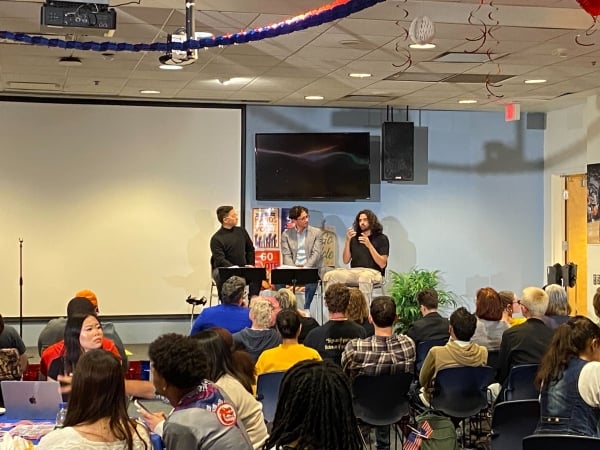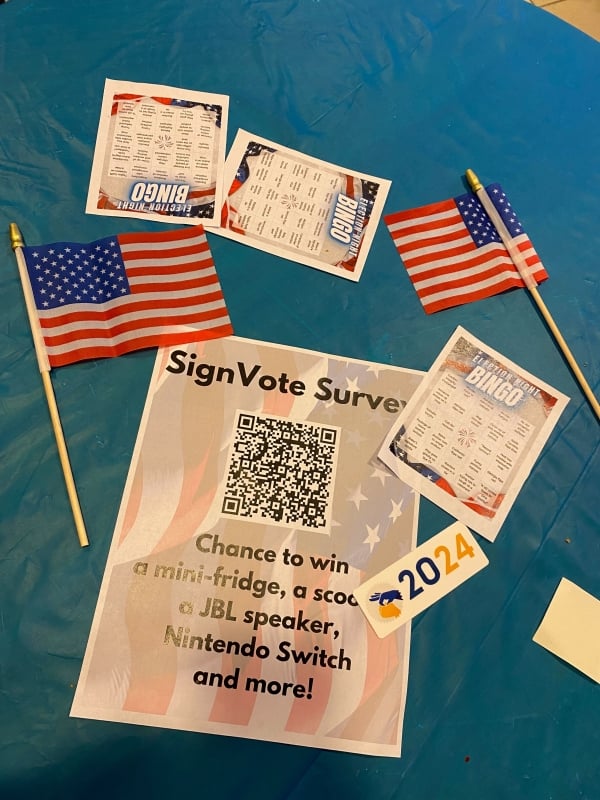You have /5 articles left.
Sign up for a free account or log in.

Gallaudet University was one of several universities across the country to host election night watch parties Tuesday, Nov. 5.
Ashley Mowreader/Inside Higher Ed
On election night, Gallaudet University in Washington, D.C., buzzed with energy, as several hundred students packed into the student center to watch results come in live. Most people in the room—which was covered in red, white and blue balloons, plus streamers and miniature American flags (as well as AI-generated images of the two candidates in various sporting events)—turned their attention to the main stage, where Gallaudet students and professors contributed to panel conversations with peers on political engagement and the election processes.
The watch party was the culmination of the university’s SignVote program, a nonpartisan voter engagement initiative for the Deaf community housed in the Center for Democracy in Deaf America (CDDA). Student SignVote ambassadors wanted to create a welcoming American Sign Language environment that invites students and community members to learn more about civic engagement and feel energized around voting.
Building up: SignVote efforts kicked off in August educating students about American civics. Gallaudet welcomes students from across the globe; one French citizen attending the watch party shared his confusion with the American two-party system.

Diego Ozuna-Clark, strategic support coordinator for the National Deaf Center on Postsecondary Outcomes; Brendan Stern, executive director of the Center for Democracy in Deaf America; and junior Trent Mora discuss the election.
Ashley Mowreader/Inside Higher Ed
Throughout the year student ambassadors tabled at campus events and hosted panel discussions. Ambassadors even filmed short videos for social media, encouraging peers to get plugged in to voting.
Gallaudet and its students are uniquely positioned, both literally and in their place in the American higher education system.
Students said they were acutely aware of Gallaudet’s campus being located a few miles from the U.S. Capitol, and the potential for violence or chaos in the aftermath of the election, but they’ve also seen good energy, such as at Democratic vice president Kamala Harris’s rally in late October on the Ellipse.
Gallaudet has close ties with the federal government, receiving a majority of its funding from the Department of Education, and junior Trent Mora worried that the election’s verdict could result in less funding for the university.
Along with teaching students about basic principles of civic engagement and election logistics, SignVote ambassadors helped students get registered to vote, which can be difficult because Gallaudet students are from all across the country, senior Ella Stromberg shared. Stromberg, hailing from Vancouver, Wash., sent off her absentee ballot before Election Day.
Making politics fun: One key theme in SignVote’s work is making politics fun for students, SignVote ambassador and senior Aubrie Bauer said. Sometimes people are upset by elections and decide they never want to vote again, but ambassadors want to help students stay open-minded and continue to engage, even in the face of disappointment.
At the election watch party, students could play election bingo as they watched cable broadcasts and tried to spot slipups in the reporting (random mention of Canada, anchor fatigue) or buzz words and phrases (“record turnout,” “it’s too close to call”). Each of the three TVs in the room had closed captioning, and one included ASL interpretation courtesy of DPAN.
American Sign Language can sometimes lack signs for political phrases—“blue wall,” for example—or signs can be used for multiple phrases (“democracy” and “Democratic Party” share a sign) which can make talking about politics confusing without context, said Brendan Stern, executive director of CDDA. “It’s a work in progress,” Stern added, with new and better signs evolving with terminology.

SignVote wants to make politics fun for students and encouraged watch party attendees to play games and provide feedback about their experiences.
Ashley Mowreader/Inside Higher Ed
SignVote also collected student feedback in a survey, and every entry had the chance to win prizes, such as a minifridge, scooter or Nintendo Switch.
Gallaudet has a long history of election nights, said Joseph Murray, president of the World Federation of the Deaf and faculty member of Deaf studies at Gallaudet. The Deaf community finds unity in their shared identity, but they also come from diverse backgrounds and worldviews, which means there’s disagreement as well, Murray said, but this is what democracy looks like in America.
What’s next: While the 2024 election season has come to a close, SignVote contributors hope to see students continue the conversation, even if they’re in disagreement with one another.
The students’ efforts have been inspirational, Stern said. Deaf people can be pigeonholed, but “we’re citizens as well,” Stern said, with wants, needs and values that are no different than other Americans’.
Gallaudet has seen record turnout in recent years, with more students choosing to vote. In 2018, 73 percent of eligible Gallaudet students were registered to vote and 26 percent of those students voted. In 2020, 80 percent of students who were eligible to vote were registered and 71 percent of them voted on Election Day, according to data from the Institute for Democracy and Higher Education.
Bauer, the senior SignVote ambassador, said she hoped students would not be apathetic and that they continue to have important questions, remaining active and attentive to their world.
We bet your colleague would like this article, too. Send them this link to subscribe to our weekday newsletter on Student Success.








